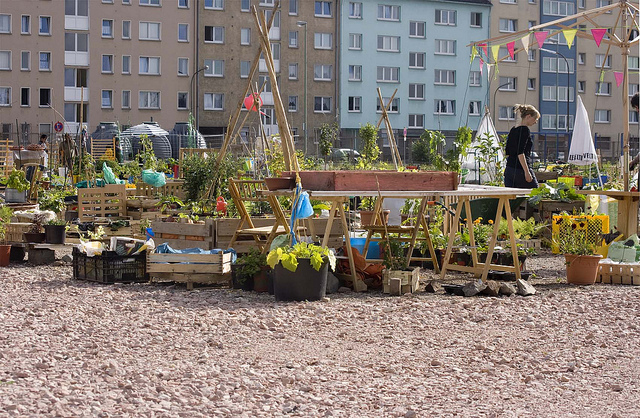By Christiane Kliemann
When talking about building alliances - the focus of the third conference day - the issue of equality immediately comes into view, as there are many dimensions of inequality deeply rooted in the current growth-based economic model. In order to overcome this model, all these dimensions need to be addressed and all possible change-agents equally taken on board.
Adelheid Biesecker, in her keynote on (re)productivity, shed the light on this topic mostly from a feminist perspective, explaining that productivity and reproductivity are still separated in the current economic system, although already being in a phase of transition (symbolized by the brackets); reproductivity including everything which reproduces the foundations of productivity: paid and unpaid labour, care-work mostly done by women, subsistency and the reproduction processes of natural ecosystems and resources.
When taking all aspects of reproductivity into account, this concept calls for the revision of our economy on the basis of new values: on how we revalue nature, foster precautionary principles and what feminists call "care-economy". Caring - for nature and for others - is not only a form of (mostly unpaid) work, but also the basis for a sustainable democracy as it includes everything we do to sustain and enable the continuation of our lives. But how to bring about change towards an economy based on these new values? In order to, for example, integrate care work in our concept of labour, we have to shorten working hours and break the gender bias due to the reliance on unpaid care-work done by women. Care-work would also have to be claimed by men just as wage-labour is claimed by women, considering that a truly sustainable economy requires gender equality as basis for innovation. But who would then be the actors to initiate such change? Everybody who experiments with new economic principles such as the unconditional basic income. However, these actors would need to be integrated into a broader feminist and anticapitalist movement in order to overcome the resistances of the current system.
Sunita Narain, the Indian environmental activist, focused in her video-keynote on the right to grow for certain parts of the global population, and asked how to best share natural resources and provide energy and mobility for the poorest while respecting the environmental boundaries. Instead of sharing growth between people and nations as originally agreed under the UNFCCC, 20 years later it has turned out that growth rates have only added up on each other which has caused us running out of space and time. Therefore we need an effective and amibitious climate agreement which can only be successful if it is fair. At the same time, the world cannot cut emissions if the options of degrowth are not seriously put on the table. Very aggressive action to reduce emission has to be taken, to the extent that truly tranformational trajectories will be needed instead of simply transitional ones.
With this, we face a double challenge: to reduce emissions while having to meet the needs of all at the same time - which, however, is also an opportunity to understand that our resource-extractive and capital-intensive needs are to be reinvented. The answer can only be found in combining the objectives of equity and natural boundaries. Solar energy for example can only be part of such transformation, if it is decentrally provided to people without any energy access at all instead of simply feeding existing grids with renewable energies. We need to think of a rights-based global agreement with tough emission reductions in the rich world and a global feed-in tariff-regime to provide energy to the poorest of the world. Not degrowth, but growth with a different face.
The same approach applies to mobility: new concepts are to be found to provide mobility for all and abandon our car-centered mobility at the same time. While there are no role models for becoming richer without increasing the number of cars, there is corporate interest which is pushing for the continutation of the car centered mobility. Thus we have to change the way we organiz mobility and share road space based on equity.
Another urgently required course correction is to overcome the environmentalism of the rich which is focused on cleaning up after the pollution has taken place. In comparison, environmentalism of the poor emerges because people simply defend their survival. They are forcing us to share growth, because development even makes them poorer and destroys the basis of their livelihood. The environmentalism. of the poor tells us that resources are limited and that there are alternative ways to sustainably share them. On this basis, we have to take the knowledge of the poor, e.g. to use local resouces efficiently without creating waste. In order to use growth so that it is equitable and sustaiable, we have to deepen democracy, listen to people and need the courage to think and be different in the world.
Exploring the possibilities of alliances for degrowth between the North and the South was the focus of a panel disussion which started with the question whether the concept of degrowth could resonate with emancipatory actors in the South. It was agreed that the idea of degrowth as such is not appealing to most people in the South, due to the large-scale deprivation people there have experienced, and therefore associate degrowth with austerity strategies for the poor. Another concern is that degrowth might not be radical enough and not explicitly anticapitalist.
In order to create alliances, it would thus be more helpful to focus on common values, create new terms and cross-cultural exchange and learning. According to Ashish Kothari, also from India, who introduced the concept of Radical Ecological Democracy, there are many common values his concept shares with degrowth. These are for example diversity, self-reliance, autonomy, cooperation, solidarity, the commons, rights with responsibilities, dignity of labour and subsistence, qualitative pursuit of happiness, justice, simplicity, enoughness, respect for all life forms - and they are directly opposite to the capitalist neo-liberaist (lack of) values.
Another commonality is that degrowth, as well as many movements from the South, aim at a holistic tranformation of economy and society as well as cross-overs, e.g. between "red and green", traditional and modern, indigenous and non-indigenous, North and South. Successful global cooperation between emancipatory movements would definitely be a powerful countercurrent against the dominant model and give hope to other initiatives who share the same values. It is recommended, however, that degrowth does not only criticize growth but also "development", and agreed that communicating with and learning from each other is more important than agreeing on specific terms such as "degrowth".

Digitalization is changing the world. And it's true: The vehicles of digitalization have spread through society at a rapid pace. Smartphones only entered the market a good ten years ago! Moreover, everywhere else in society - in companies, administrations, in agriculture, in transport and even in art and music - sensors, processors and many other digital devices are introduced. Yes, it is fair ...

The wider degrowth-community is asked to participate in a short survey on sustainable mobility which should not take more than 10-15 minutes: The results will be used as a part of Justin Hyatt´s academic work at the Institute for Housing and Urban Development Studies (IHS), Erasmus University, Rotterdam (Netherlands). It is also intended to publish and widely disseminate a separate report. ...

On the Need for Collaboration Between Social Movements and Activisms Not that long ago, I left North America and arrived fresh and starry-eyed in Lund, Sweden, ready to begin my master’s degree in a program entitled Culture, Power and Sustainability. In my second year, I decided to write my thesis about the Transition Town movement, a social movement out of Great Britain born of the need to ac...